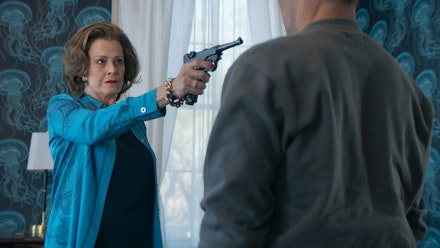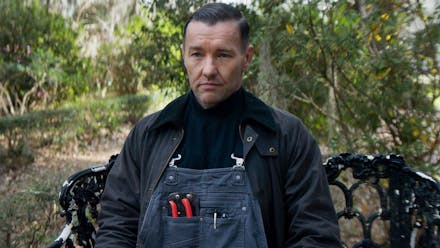Master Gardener marks the conclusion of Paul Schrader’s loose trilogy about broken men seeking redemption in modern America. After the deep questioning of faith suffered by both Ethan Hawke’s alcoholic minister in First Reformed and Oscar Isaac’s convicted Abu Ghraib-torturer-turned-gambler in The Card Counter, here we get Joel Edgerton as a haunted man willing to live with past guilt without sacrificing what he has left, while keenly looking at what lies ahead.
Edgerton’s Narvel Roth is introduced as a typical Schrader ‘lonely man’. Like Travis Bickle in Taxi Driver — still Schrader’s most famous screenplay — and the men of this recent trilogy, Narvel addresses us in a voiceover, and writes his diary alone in his small, empty home. He carefully explains the thinking behind types of gardens and gardening methods, prophetically intoning, “A garden is a belief in the future, that change will happen.” Roth is the chief gardener at Gracewood Gardens, a beautiful expanse of flowers and shrubs attached to a New Orleans family estate owned by Norma Haverhill (Sigourney Weaver).

Narvel’s small team is diligently preparing the gardens for a yearly charity event when Norma, who calls Narvel “sweet pea” and has weekly trysts with him, asks him to train her mixed-race grand-niece Maya (Quintessa Swindell) in his green-fingered ways. Weaver’s expert handling of Norma’s familial guilt, or lack of it, is in keeping with the steady, subtle balance at play throughout Master Gardener; like Schrader’s crisp dialogue — or the finest plants Gracewood has to offer — it’s measured and pristine.
In lesser hands, the juxtaposition of themes would be portrayed in melodramatic fashion or just appear as an incomprehensible mess.
Once Maya arrives, her and Narvel’s relationship develops assiduously from teacher and pupil to lovers. Some may baulk at the romance of early 20-something Maya and late-40s Narvel; Norma ungraciously compares their union to Lolita. But as their connection blossoms, so do their problems: through sporadic, occasional flashbacks we learn of Narvel’s violent past in a gang and discover that he is some years into witness protection. For her part, Maya appears to be struggling with her own addictions, which brings some unsavoury figures from her past into Gracewood’s orbit.
In lesser hands, the juxtaposition of drug addiction, gang violence, wealth, poverty and complex interpersonal relationships would be portrayed in melodramatic fashion or just appear as an incomprehensible mess. Yet one has faith in Schrader, a man who adeptly tackled race and class in Blue Collar and drug addiction in Light Sleeper and clearly knows his way around a spiritual crisis. Master Gardener’s subtlety and dry visual styling is in keeping with its understated emotional centre (and Devonté Hynes’ delicate score). Its pace may be too considered for some viewers — but as all true gardeners know, patience brings its own reward.
